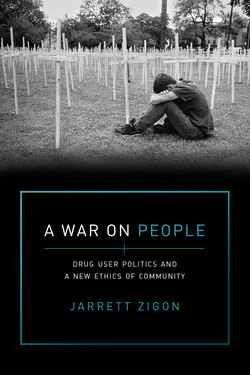A War on People

Реклама. ООО «ЛитРес», ИНН: 7719571260.
Оглавление
Jarrett Zigon. A War on People
Отрывок из книги
A War on People
Drug User Politics and a New Ethics of Community
.....
Michael Hardt and Antonio Negri, in contrast, have famously responded to the condition of war as governance with a call to the multitude to resist by means of what they call biopolitical production, or the immanent creation of “social relationships and forms through collaborative forms of labor.”38 But the question must be asked: Why fight the imposition of biopolitical will with more biopolitics? Because it remains within the plane of bios, or socially qualified life, does biopolitical production not risk a differential reproduction of the same that I have argued elsewhere is characteristic of reformist politics?39 In contrast to this call for more biopolitical production, I will argue and show throughout this book that today we need to think, conceive, and act beyond biopolitics and begin thinking in terms of an onto-ethical politics of worldbuilding. It is my contention that the anti–drug war movement offers a glimpse of such a politics, by which new forms of social relations are created because new worlds and ways of being-with are created. This is recognition that worlds and social life—including labor—as well as, human-nonhuman relations always have a particular onto-ethical grounding, and so a desire to change the former demands the political and intellectual experimental creation of the latter.40
As I hope to make clear, a politics of worldbuilding is quite different from what most left-leaning political activity has become today. This difference is best understood in terms of the necessity of offering a political vision and the tactics for realizing this vision in a lasting manner. Although there are certainly some left-leaning movements that have clear and articulated aims with a variety of tactics well suited to meet them, this is clearly not the case for the Left in general and especially so for the most visible of left political activity today. To a great extent this political activity—perhaps the epitome of which was the horizontalist prefiguration of Occupy and other similar “activity”—has become limited to temporary spectacular and carnivalesque protest, increasingly combined with some form of occupation, that emphasizes process over results, tactics over strategy, intimate locality over abstract globality, identity over conditions, and individualizing simplicity over complexity.41 This has led to a current state of affairs in which it often seems as though the only aim of political activity is little more than performative rituals for voicing dissatisfaction,42 oftentimes articulated in the register of moralism,43 symbolic occupation of buildings or public space, and a temporary prefigurative enactment of a localized process with no long-term strategy for any actual transformation.44 Far from actually changing worlds, this prefigurative politics of performative ritual primarily results in a seemingly endless process of network building and the realization of affective solidarity.45 Such a “politics,” then, has come “to be about feelings of personal empowerment, masking an absence of strategic gains.”46 To paraphrase Lauren Berlant’s assessment of a similar form of political activity: this may feel good but it does very little to change anything.47
.....